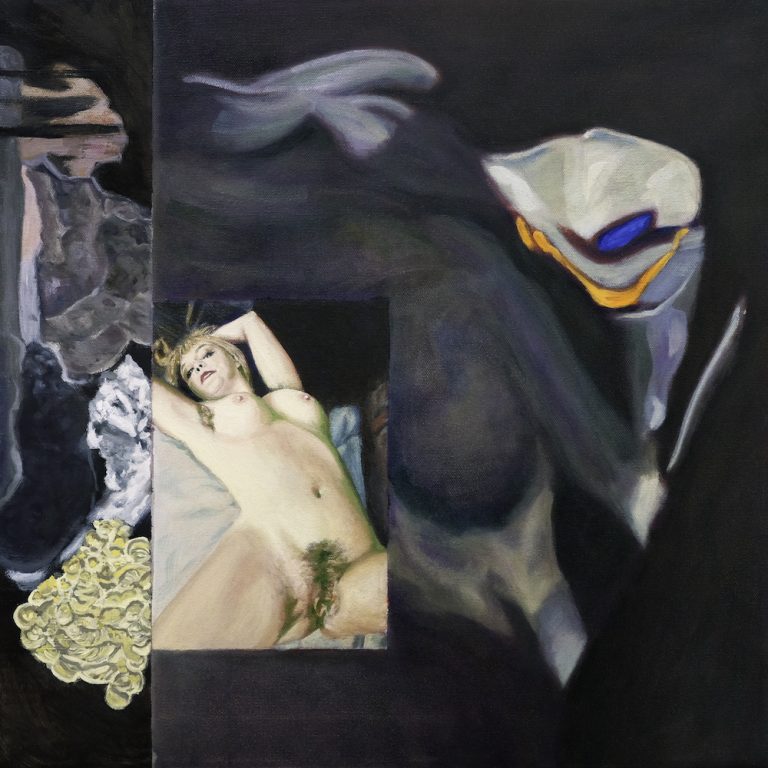It’s an emotional and physical wasteland everywhere you look. Everyone is isolated, the sky is perennially black and everything is coming to an end – yet the gnawing need to be heard and understood and loved remains. This is the state of the internal and external world that Erin Birgy is experiencing and which she brings to life on End of Everything, her seventh album as Mega Bog.
The new record sees Birgy switching from guitar to piano and synth as the basis of her songs. This means that the jazzy inflections that have characterised her previous work are toned way down, but the urgency and immediateness is enhanced. This is heard especially on the first half of End of Everything, which is filled with fast-paced synth-pop songs that could be mistaken for Future Islands if you removed Samuel T. Herring’s lovelorn musings and put near-operatic paranoia in their place.
This frantic first half resides within Birgy’s own personal sphere, finding her uncertain of her shape and losing personal definition. The heedless charge of opener “Cactus People” has a subtle swing to it, emphasised by Birgy’s sumptuous, seductive vocal as she attempts to lure her lover back into bed. However, this quickly unravels when her lover decides to head out into the darkness, leaving Birgy to desperately repeat “don’t leave tonight”. This profound uncertainty carries into “The Clown”, another pinwheeling synth-pop gem where she fights off the “psychic waste I’ve absorbed” to try to rediscover herself in the eyes of another, begging to know “How do you see me now?”
This desperation for approval from external sources continues as a running theme in the first half of End of Everything. Birgy is an emotionally bruised and bereft lover once again on the brass-imbued power popper “Love Is”, where the gorgeous moans of Westerman add another shade of heartache. On “Don’t Doom Me, Now” she’s slowly coming to accept that nobody is coming to hold her or help her; “we’re not meant to live alone / alone / where’d everyone go?” she pleads as she wiggles across a groovy and atmospheric arrangement.
In each of the songs on the first half of End of Everything, the interplaying synth lines and the propulsive drumming from Big Thief’s James Krivchenia locks in the energy, slowly turning the dial upwards in tandem with Birgy’s desperation, propelling the songs to breathless finales and exceptional vocal prowess. While some may still miss the weird arrangements of Birgy’s previous work, the more streamlined approach here allows her to reach powerful peaks – most notably on the climax of “The Clown” – and it is more than enough justification for this gear switch.
The second half of End of Everything sees things slow down. “All and Everything” is a grandiose, theatrical build as Birgy comes to the simple but powerful assertion “It’s something I’m trying / Commit to / All and everything”, those final words repeated and augmented into a battle cry to do better for herself, for humanity, for every living thing on the planet. However, that fledgling hope is tested as she steps outside into the decaying world on the following “Anthropocene”. Augmented by bells and gongs, the stately song finds Birgy observing death everywhere, both that of dead flies in her home and of the more shocking sight of a burnt up alligator (“what the fuck?” she accurately cries). As the momentum picks up and things brighten in the second half of “Anthropocene” it seems like a veil lifting, but it’s a cruel trick; the sun has risen, but everything is still dead; “You waited so long / It’s all gone,” she mournfully repeats as the song extinguishes.
“Complete Book of Roses” employs a skeletal bossa nova type rhythm, but this is a song that is not interested in making your body move; it drifts through a fantastical and poetic account of Birgy’s restlessness and uncertainty, punctuated by guitar clangs and guttural growls. Finally, we’re dropped off at the “End of Everything”, a desolate place at the end of perception, winds swirling around Birgy as she is forced to accept separation from her love. Layers of synth organ and disembodied choral voices pile up in dramatic fashion as the clouds part to reveal the abyss; “the end of all / the end of everything.”
End of Everything is not an obviously uplifting album, but it is in many places breathtaking. The seeds were planted in the pandemic, as the theme of separation makes clear, but Birgy’s abstract lyricism and vocal urgency ensures that they are not stuck in that time period; they are as much related to current issues being faced every day, personally and globally. The words may speak of desperation and desolation, but delivered in Birgy’s growling, puncturing and hair-raising style, the feeling transmitted is one of personal strength, perseverance and eternal vitality – even at the end of everything.


